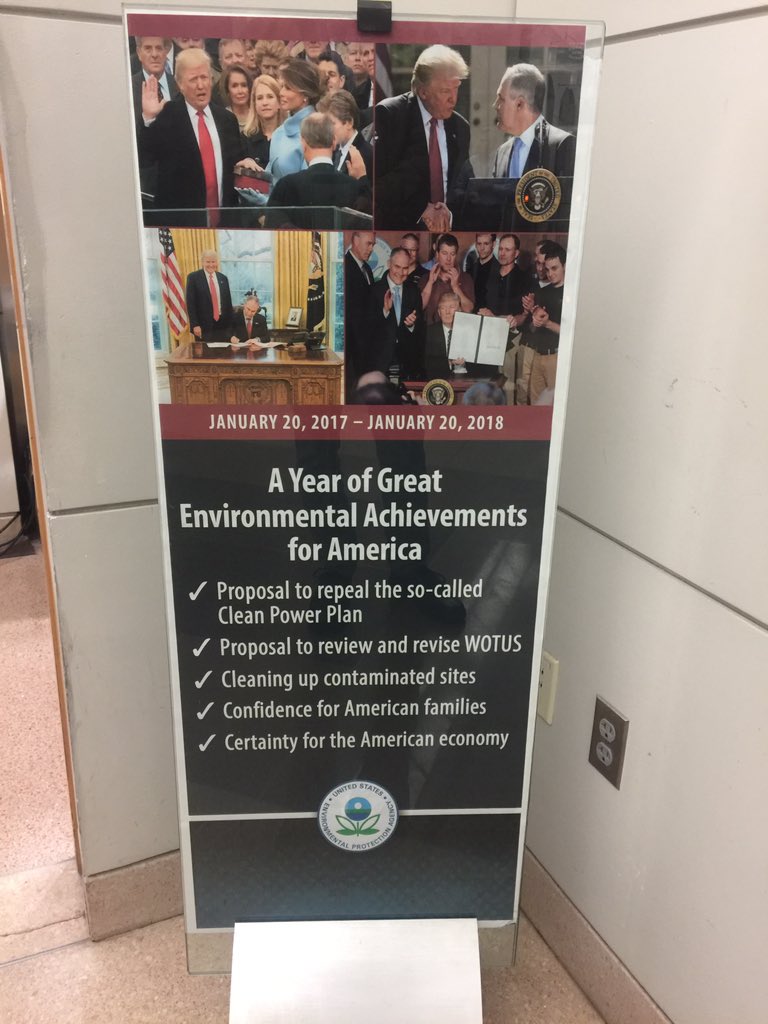John Hanno January 30, 2018
The Koch Effect
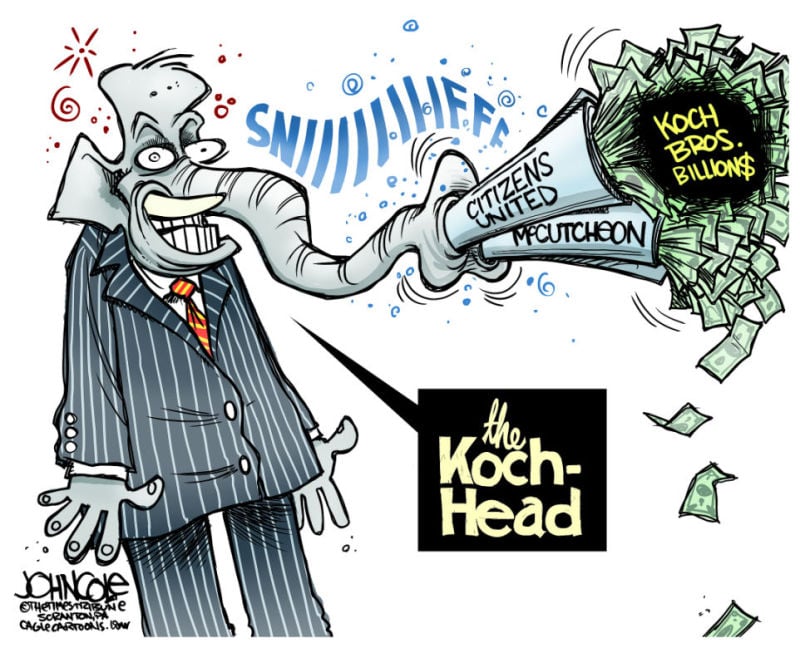
Yes, our political system is broke, thanks to the U.S. Supreme Court decision in Citizens United, to Republi-cons who respect no ethical or legal boundaries (including congressional and legislative district borders) – who will do anything to “Win” and prop up their dying party, and to a cabal of obscenely rich autocratic and predatory old white men, who believe they alone should rule the world.
But all the benefits they’ve received from our erstwhile prosperous and expanding middle-class based economy is in serious jeopardy. Unfortunately they’re too stupid or obsessed with greed to realize, that if America’s middle-class crumbles, their gravy train will eventually derail.
These toxic crony capitalists somehow believe they’re solely responsible for their wealth and good fortune. They’re quick to criticize folks who just “need to pull themselves up by their boot-straps.” “If they can do it, anyone can.” Thankfully, everyone’s not so obsessed with greed, that they follow in their “mo money” footsteps.

If it were up to these greedy bastards, they would pay absolutely no taxes to support the commons, would refuse to fairly share their wealth with faithful employees or their communities and would engage in any scheme, legal or otherwise, that would make them even richer.
Fortunately these old farts will soon be spreading their toxic brand of capitalism and far right ideology in the Here-After. America and the world will be better for it.

I read a study where once you reach an annual income of $75,000, you’re no happier if you earn more. I think the authors were on to something because every time I see trump, the Koch brothers, Sheldon Adelson, the Mercers or any of the other GOP mega donors, they all look incredibly miserable. They must store up their regrets, the imagined slights and persecution and just can’t seem to appreciate their good fortune.

Charles and David Koch have a combined net worth of almost $100 billion, the second richest family in America. I’m sure they’ve always worked hard but they didn’t accumulate that enormous wealth on their own. They were left a fortune by their father and I’m sure their vast assortment of businesses have benefited greatly from taxpayers who support our government and the public commons and infrastructure.
I don’t know if the Koch’s are as averse to paying taxes as trump or as reluctant to show their tax returns, but they spent $20 million supporting the just passed Republican tax legislation for the betterment of corporations, the rich and the politically connected, and a conservative group led by the brothers are now funding a $20 million public relations campaign to tout the benefits of that tax bill con. They also pledged almost $900 million from their political action committee to Republican candidates during the 2016 campaigns. And will spend $400 million more during the 2018 mid-term elections.
As rabid Libertarians, they’ve never been fans of America’s particular form of democratic socialism. Corporations hate social welfare, unless that socialism benefits their bottom line. So worried that America would sink to the depths of say, a socialist European country, or God forbid even worse, a Scandinavian country, that the Koch’s have spent their entire adult lives supporting libertarian causes and fighting against socialist tendencies of any sort.
They’re particularly fond of supporting ALEC anti-labor and right-to-work legislation across the country. And in Wisconsin, they’ve showed a particularly venomous bent by supporting an anti public employee, anti-teacher union, anti-environmental and pro corporate agenda. Wisconsin, a birthplace of the Progressive movement, now represents the worst of corporate controlled state government.

Some recent polls show Millennials and younger Americans harbor an increasing distaste for the predatory form of capitalism practiced by trump, the Koch’s and others. When these old buzzards have all died off, hopefully a more democratic form of social community will emerge and begin to reverse America’s enormous wealth and income disparity.
I don’t wish to leave the impression that all rich folks are like these turkey vultures. A large group of wealthy Americans signed petitions and supported efforts to defeat the Republi-con tax cut fraud. They actually believed their taxes should be raised instead of cut. And there are many thousands who obey the law, pay their fair share of taxes, or even more, aren’t afraid to show their tax returns, play by the rules, share their wealth and good fortune with their governments, their communities and their employees and partners. They support the commons, don’t cheat, tell the truth and from all appearances, are well respected happy human beings.
The Koch’s typically re-invest more that 90% of their profits back into their companies. They’re the number one supporter of conservative, Republican, libertarian, anti-labor and anti-social welfare and anti-socialist programs. I guess that doesn’t leave much for charitable donations.
Compare that to Warren Buffet and the Gate’s family (including Bill’s wife Melinda and his father). In July of 2017, Mr. Buffet donated another $3.17 billion of Berkshire Hathaway stock to the Bill & Melinda Gates Foundation and four family charities. That brings his total contributions since 2006 to $30 billion or more. Buffet has pledged more than 99% of his wealth to charity during his lifetime or within 10 years of the settlement of his estate. The Gates have also donated more than $30 billion of their wealth to their foundation. In 2010, Buffet and Gates created the Giving Pledge program, which encourages billionaires throughout the world to donate at least half their fortunes to charity. As of 2017, there have been 173 pledgers. Mr. Buffet still owns 17 percent of Berkshire, despite donating more than 40 percent of his stock. I think one can be sure that trump, the Koch’s and others of their ilk are not Giving Pledgers.
I believe an overwhelming number of humans, if blessed with the Koch’s wealth and power, would be thankful to keep just a few hundred million or half a billion dollars for themselves and their families and then donate the rest to those in need; and would also spend their time making this world a better place. I’m sure most of us would not spend so much money and effort fighting attempts to increase the minimum wage and living wages for public employees, teachers and organized laborers.
Or would not spend millions to defeat and overturn the lifesaving Patient Protection and Affordable Care Act (Obamacare) and would not support efforts to stop the inevitable march to single payer health care for all Americans. We would not stay up nights scheming ways to cripple Social Security, Medicare, Medicaid and other social welfare programs for the poor and middle-class. We would not be obsessed with turning a vibrant and prosperous middle-class into a horde of desperate workers willing to work for peanuts.

What drives these folks to deny others just a little bit of the good fortune they’ve been blessed with? I remember the July 2007 Senator Ted Kennedy speech in the U.S. Senate, advocating for an increase in the $5.15 minimum wage to $7.25 over a 2 year period, which hadn’t been increased in 10 years because Republicans filibustered any vote on the bills. After 5 whole days of debate, Kennedy asked: “$240 billion in tax cuts for corporations, $36 billion in tax breaks for small businesses, a 42% increase in productivity, but no increase in the minimum wage. What is the price you want from these working men and women? What cost? How much more do they have to give? and “When does the greed stop?”
And what drives people like the Koch’s to plunder the earth by destructive mining and fossil fuel extraction, including the dirtiest of all toxic tar sand mining and pipelines, no matter the harm to our environment? Why do they risk destroying America’s air and precious water just so they can become even richer? “When does the greed stop?

These predatory capitalists will try their damnedest to accumulate as much money as they can – any way they can. Buying political fealty is their primary modus operandi. This current crop of elected Republi-con enablers have forsaken all integrity and sense of duty to the American people. No deviancy from the normal is too low to stoop for this corrupt white house and republi-con congress. Even conspiring with the Russians is not a bridge too. And attacking and tearing down the free press and our Democratic institutions, including the Justice Department, is part of their tyrannical grand plan.
Unless the corporate and toxic dark money is wrenched from our political system, nothing much will change; the enormous infusion of mega donor payoffs are too tempting for low character republi-con supplicants to pass up. Public financing of campaigns is the only real answer.
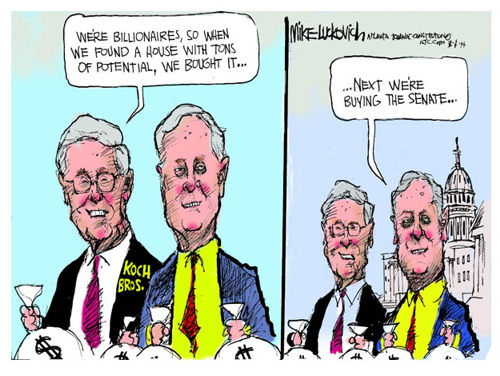
The Koch’s are worried that their paid political sycophants in the U.S. Congress and in state legislatures across the country, even in red states, are heading for a 2018 mid-term ass-whoopin. Its patriotic American’s job to make their premonition come true. Vote for folks who will stand up for women, for workers, for immigrants and dreamers, for our environment, for our National Parks and public lands, for common sense and science, for public education, for American Democracy, for a free and fair media and most importantly, for the truth.
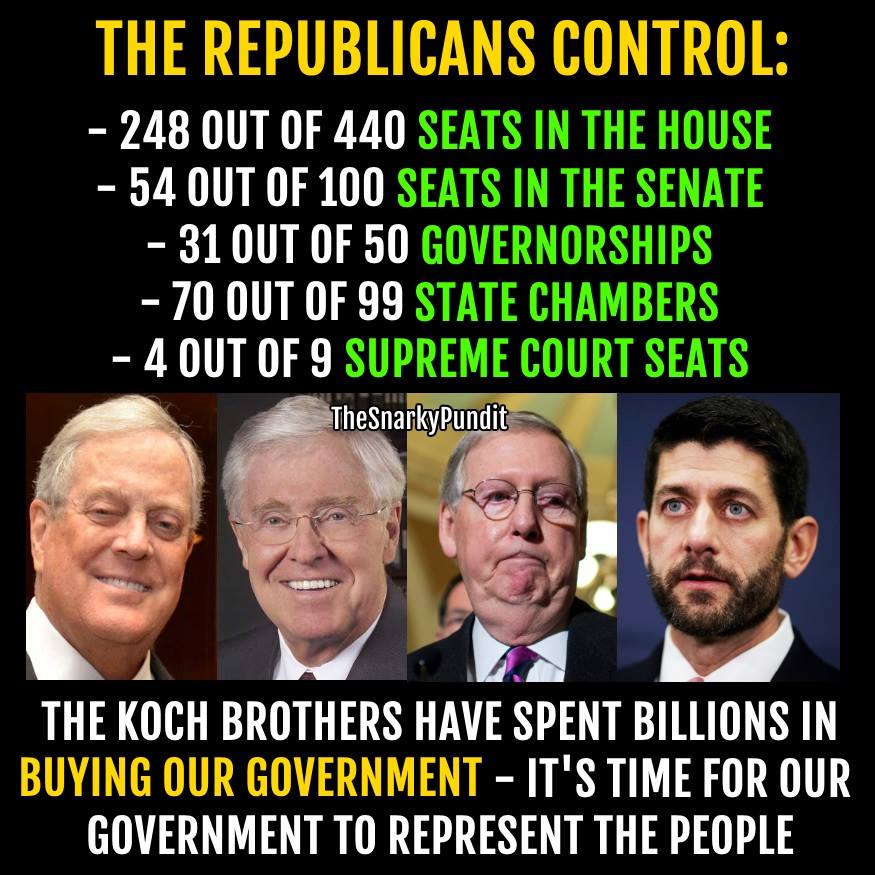

 The Republican Party could be in serious trouble when it comes to attracting younger voters, according to a new in-depth
The Republican Party could be in serious trouble when it comes to attracting younger voters, according to a new in-depth  © Getty Images
© Getty Images Suzann Pettersen and Donald Trump in 2007. (Getty)
Suzann Pettersen and Donald Trump in 2007. (Getty)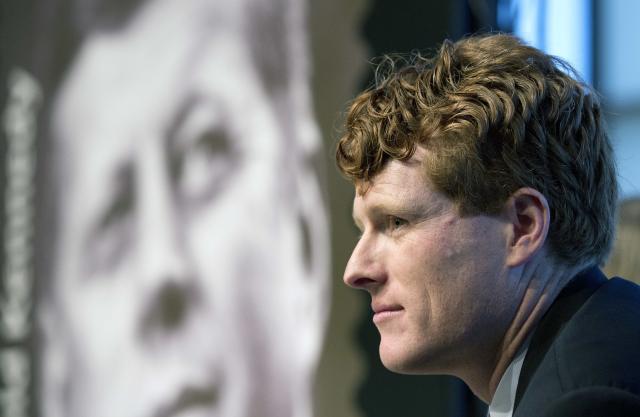 Rep. Joseph P. Kennedy III, D-Mass. (Photo: Michael Dwyer/AP)
Rep. Joseph P. Kennedy III, D-Mass. (Photo: Michael Dwyer/AP)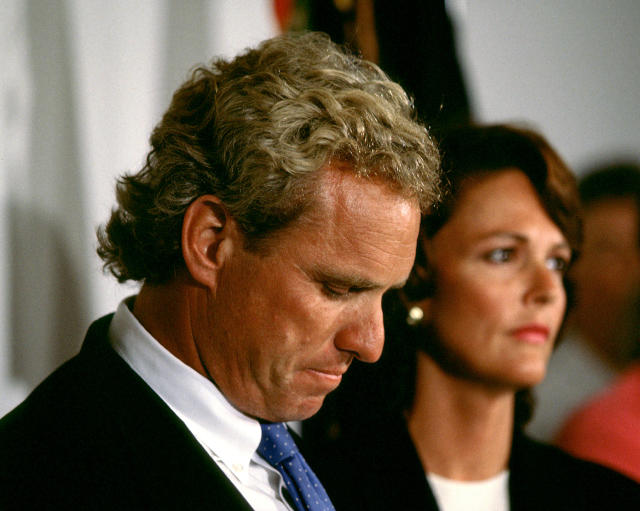 In August 1997, Joe Kennedy II, joined by his wife Beth, announced he would not be running for governor. (Photo: Brooks Kraft LLC/Sygma via Getty Images)
In August 1997, Joe Kennedy II, joined by his wife Beth, announced he would not be running for governor. (Photo: Brooks Kraft LLC/Sygma via Getty Images) Joe Kennedy III officially launches his campaign for Congress on Thursday in Newton, Mass. (Photo: Suzanne Kreiter/Boston Globe via Getty Images)
Joe Kennedy III officially launches his campaign for Congress on Thursday in Newton, Mass. (Photo: Suzanne Kreiter/Boston Globe via Getty Images)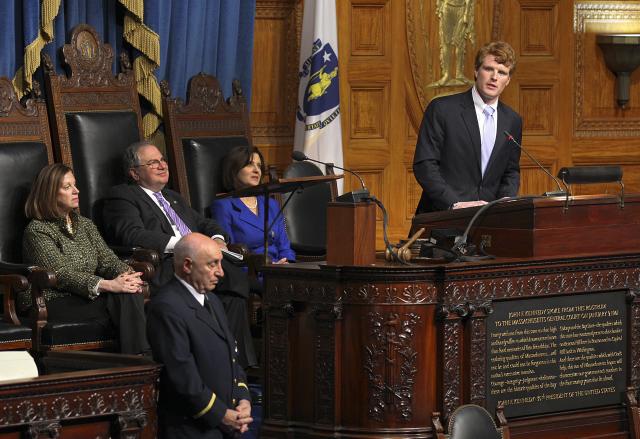 Joseph Kennedy III at the 50th anniversary of JFK’s inauguration at the State House in Boston. (Photo: David L Ryan/Boston Globe via Getty Images)
Joseph Kennedy III at the 50th anniversary of JFK’s inauguration at the State House in Boston. (Photo: David L Ryan/Boston Globe via Getty Images)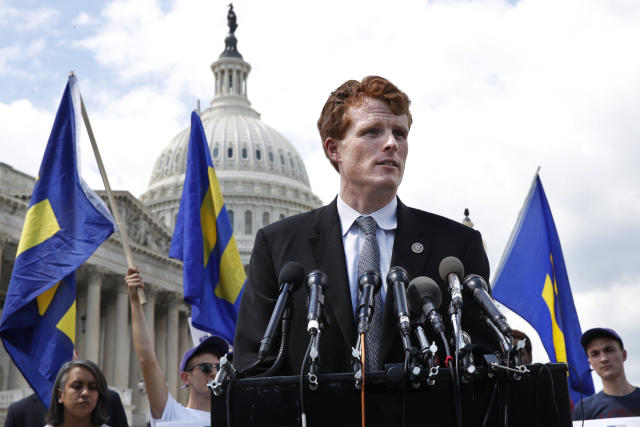 Kennedy speaks in support of transgender members of the military, July 26, 2017. (Photo: Jacquelyn Martin/AP)
Kennedy speaks in support of transgender members of the military, July 26, 2017. (Photo: Jacquelyn Martin/AP) WASHINGTON, DC – FEBRUARY 27: (AFP OUT) U.S. President Donald Trump speaks at the National Governors Association meeting in the State Dining Room of the…
WASHINGTON, DC – FEBRUARY 27: (AFP OUT) U.S. President Donald Trump speaks at the National Governors Association meeting in the State Dining Room of the… President Trump arriving at the White House on Friday. Credit: Eric Thayer for The New York Times
President Trump arriving at the White House on Friday. Credit: Eric Thayer for The New York Times:format(webp)/cdn.vox-cdn.com/uploads/chorus_image/image/58490215/scott2.0.jpg) Javier Zarracina/Vox
Javier Zarracina/Vox